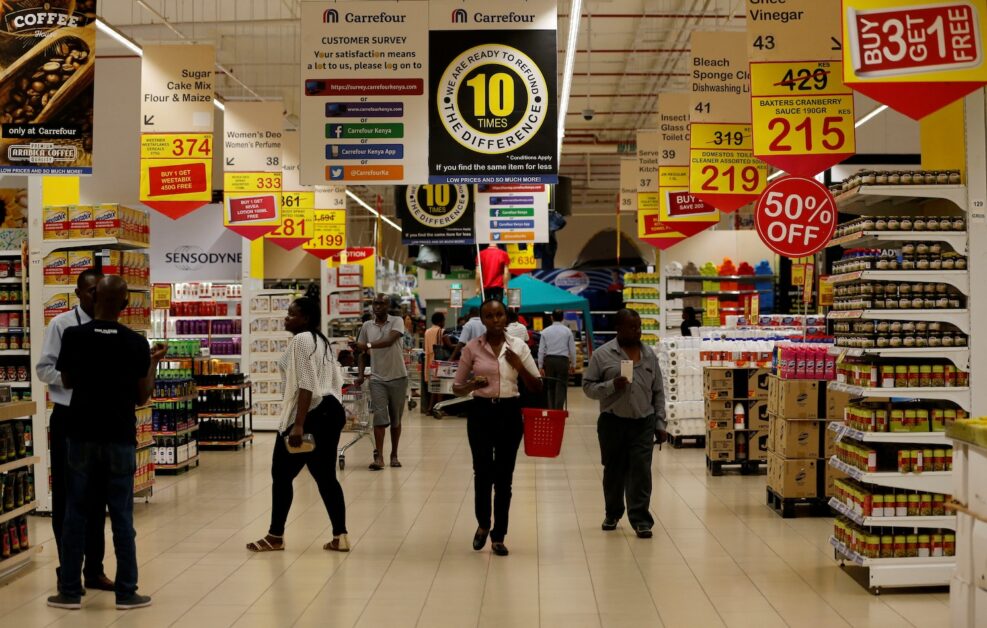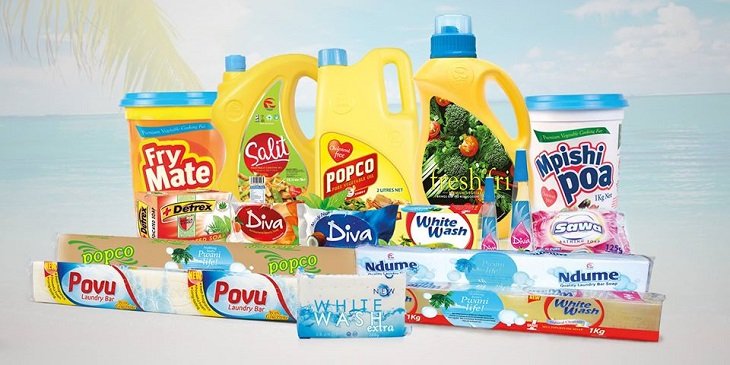The Competition Authority of Kenya, has penalised Majid Al Futtaim Hypermarkets Limited, which trades in Kenya under the brand name Carrefour, a total of KES 1,108,327,873.60 (USD7.2 million) for separately abusing its superior bargaining position over two of its suppliers ⏤ Pwani Oil Products Limited and Woodlands Company Limited.
The authority has also been ordered to amend all its supplier contracts and expunge clauses that facilitate abuse of buyer power, including but not limited to the application of listing fees, collection of rebates, and unilateral delisting of suppliers.
The Authority enforces the Competition Act to enhance the welfare of Kenyans by, among other roles, sanctioning Abuse of Buyer Power (ABP).
Buyer power, according to the Authority, refers to the ability of a powerful buyer to obtain terms of supply outside the scope of normal business practices or that are disproportionate, unfair and detrimental to a supplier, or unrelated to the objective of a supply contract. It also refers to the ability of a buyer to reduce profitability below a supplier’s normal selling price, or more generally, obtain terms of supply more favourable than a supplier’s ordinary contractual terms.
The Act provides a non-exhaustive list of the manner through which ABP manifests in the marketplace including reducing supply prices by significant amounts or below competitive levels, threats of termination or unilateral termination of contract without a reasonable justification, delaying payments, refusal to receive or return goods without justifiable reasons, and transfer of costs or risks to suppliers.
Woodlands processes and supplies retail stores in Kenya with refined natural bee honey from Kitui County. Pwani Oil processes and supplies Fast-Moving Consumer Goods, specifically edible oil/fats, skin-care products and washing soap products.
The Authority has also ordered Carrefour to refund the Woodlands and Pwani Oil a total of KES 16,757,899 (USD108,000) in rebates deducted from their invoices as well as KES500,000 (USD3,200) that was billed as marketing support (store opening/listing fees).
Rebates are a refund of a percentage of sales offered by a supplier to its customer, for example, a retailer, in exchange for a benefit such as early payment by the retailer, or as a reward for surpassing designated purchasing targets or an incentive for an increase of volumes ordered by the retailer.
Carrefour, according to the regulator, charges its suppliers at least three types of non-negotiable rebates that are as high as 12%. The rebates are deductible annually and monthly and have been increasing on an annual basis, thereby significantly reducing the final payout to suppliers. Investigations also determined that Carrefour’s suppliers are required to provide free products and pay listing fees for every new branch opened as well as post employees to the supermarket’s branches.
“These practices amount to the transfer of the retailer’s costs to suppliers, which is prohibited by the Competition Act,” the regulator said in a statement.
Specifically, Woodlands was required to provide one carton per stock-keeping unit (SKU) and pay KES50,000 (USD320) as a condition to commence supplies at new branches. Pwani Oil was required to provide two free cartons per SKU and pay KES 200,000 (USD1300) for similar purposes. Given that one product has several SKUs based on variants produced, this requirement has significant financial implications on the profitability and competitiveness of suppliers.
The Authority’s Acting Director-General, Dr. Adano Wario, noted that ABP is typically meted out on Small and Medium-Sized Enterprises (SMEs) who accept adverse conditions from their powerful buyers who control critical infrastructure and access to consumers, such as a country-wide network of branches.
“SMEs account for 98% of all businesses in Kenya, contribute up to 40% of GDP and are the source of livelihood for millions of Kenyans, directly and indirectly. However, despite their centrality to economic progress, SMEs in the country contend with various challenges leading to the closure of many businesses in infancy,” the regulators statement said.
“At the core of the Authority’s mandate execution is the promotion of inclusive economic development. Abuse of buyer power defeats this aspiration by crippling suppliers, who are mostly SMEs, and whose contribution to our economy cannot be overstated,” noted Dr. Wario.
“While appearing to enable an offender to offer lower prices to consumers, this apparent benefit is short-term and unjustifiable when placed against the long-term damage caused to the upstream supplier market, including forced exits, especially by SMEs in the manufacturing sector.”

Whereas businesses have the freedom to enter into contracts with each other, these agreements should not unjustifiably disenfranchise the weaker party and must facilitate negotiations without reprisal, he added.
Mr. Shaka Kariuki, the Authority’s Board Chairman, said the CAK aligns its interventions with the Government’s agenda of promoting growth of SMEs and the manufacturing sector while ensuring that its actions positively impact as many Kenyans as possible.
“Our role as a regulator is to promote healthy competition in our markets with the overall objective of creating a conducive business environment for attracting investment into the national economy and to the benefit of consumers,” Mr. Kariuki said.
“The penalty the Authority has issued serves as a stern reminder and deterrent to businesses not to engage in any conduct that infringes the Competition Act. Effective competition benefits us all,” added Mr. Kariuki.
Background to the case
The investigations into alleged ABP were lodged separately by the Woodland and Pwani Oil.
Woodlands presented a complaint to the Authority in December 2022 alleging that between 2021 and late 2022, the retailer engaged in ABP contrary to section 24A(1) of the Competition Act and that the conduct unfairly reduced its returns and profitability, thereby affecting its ability to remain competitive in the market.
Woodlands specifically alleged that Carrefour deducted various rebates and other fees from its invoices for products supplied, including fixed rebates of 11.5% in the year 2021 and 12% in 2022. The company further alleged it was required to post its employees to work at Carrefour premises, including conducting all-night stocktaking.
The complainant provided various evidentiary information to support its allegations, including annual supply agreements, invoices, records of rebates deducted, and records of supplies to other leading retailers.
Upon assessing the documentation, the Authority issued a notice of investigation to Carrefour and invited them, or their legal representatives, to respond to Woodlands’ allegations.
Carrefour denied exerting buyer power against Woodlands or treating them unfairly. The retailer admitted to issuing standard-term supply contracts with clauses facilitating the deduction of rebates and deducting the same. It argued that the rebates were agreed upon by the parties and are a global industry practice. The Authority’s investigations in the sector and review of international practice established this position to be incorrect. In fact, the retailer has been penalised in other markets for similar conduct.
Further, the retailer denied demanding its suppliers attach merchandisers at its outlets.
The Authority’s investigations, which included reviewing the retailer’s evidentiary information and conducting a market analysis, established that Woodlands was economically dependent on Carrefour (evidence of buyer power). Further, the supplier never challenged the unfair terms due to fear of retribution in the form of delisting.
Upon issuing a notice of proposed decision to the retailer in July 2023, Carrefour, through its legal representatives, indicated it had reached a settlement with Woodlands to close the matter. The retailer was advised that the Authority’s investigations may only be concluded;
Upon a finding that the evidence before it does not support a finding of conduct prohibited by the Competition Act; upon a finding under section 36 of the Competition Act under which the Authority may impose a penalty among other possible remedies; and/or under section 38 of the Competition Act which empowers the Authority to enter into a settlement agreement with the undertaking(s) under investigation. In this case, an agreement to close the case can only be between the Authority and Carrefour.
In October 2023, pursuant to Section 38 of the Competition Act, the retailer’s new legal representative filed a settlement offer with the Authority for consideration. This was followed by meetings and an exchange of counter-offers between the Authority and the retailer.
The settlement negotiations reached an impasse. In view of the fact that the conduct is ongoing and injuring the retailer’s suppliers (who are in the thousands), as evidenced by fresh complaints against the retailer currently under review, the Authority proceeded to make a determination.
On this matter, Carrefour has been penalized KES 554,163,936.80 (USD3.6 million) and further directed to refund rebates deducted from Woodland’s invoices in 2021 and 2022 amounting to KES 834,180 (USD5,400). Further the retailer has been ordered to refund Woodlands Limited KES 100,000 (USD 650) being monies paid as marketing support for store opening during the same period. When calculating the penalty, the Authority considers, among others, the nature of the infringement, duration and scale of the violation, as well as cooperation by the parties.
In The Matter Of Pwani Oil
Some of Pwani Oil’s complaints to the regulator were that contrary to section 24A of the Competition Act, Carrefour deducted various rebates and other fees from its invoices, charged listing and marketing fees, declined to negotiate the supply contract, and threatened to delist the Pawn Oil if it did not accept the presented terms.

As with the Woodlands matter, the Authority reviewed the evidence provided and issued a notice of investigation to the retailer, inviting them, or their legal representatives, to respond to the allegations. In March 2023, the Authority published a Cease and Desist Order in the Kenya Gazette, ordering Carrefour to immediately stop charging and collecting rebates from Pwani Oil pending the conclusion of investigations in the matter.
A month later, Pwani Oil presented a further complaint of abuse of buyer power claiming that the retailer had unilaterally terminated their commercial relationship without an objectively justifiable reason and notice shortly after the Authority issued the Cease and Desist Order.
Carrefour’s defence in the Pwani Oil matter was largely similar to the Woodlands case. The retailer however denied having threatened or delisted Pwani Oil. While admitting to collecting listing fees from suppliers, the retailer contended that this is a global practice in the retail sector. The Authority’s investigations in the sector and review of international practice established this position to be incorrect. In fact, the retailer has been penalized in other markets for similar conduct.
The retailer also denied that its supply terms with Pwani Oil were detrimental to the processor’s (Pwani Oil) ability to remain competitive. However, it confirmed declining Pwani Oil’s proposal for re-negotiation of the supply contract. Upon issuing Carrefour with a notice of the proposed decision, the retailer’s legal representatives informed the Authority of ongoing negotiations to settle the matter with Pwani Oil. As with the Woodlands matter, the retailer was advised accordingly.
In October 2023, the retailer’s new legal representative filed a settlement offer with the Authority for consideration. This was followed up by meetings and presentations of counter-offers from both parties. The settlement negotiations reached an impasse. Because the conduct is ongoing and injuring the retailer’s suppliers (who are in the thousands), as evidenced by fresh complaints against the retailer currently under review, the Authority proceeded to decide on the matter.
Carrefour was penalized KES 554,163,936.80 (USD3.6 million) and further directed to refund rebates deducted from Pwani Oil’s invoices in 2022 and 2023 amounting to KES 15,923,719 (USD103,000). Further the retailer has been ordered to refund Pwani Oil KES 400,000 (USD 2,600) being monies paid as marketing support for store opening during the same period. When calculating the penalty, the Authority considers, among others, the nature of the contravention, duration and scale of the violation, as well as cooperation by the parties.
Like in the Woodlands case, the supermarket chain is is also required to amend all its supplier contracts and expunge clauses that facilitate abuse of buyer power, including but not limited to the application of listing fees, collection of rebates, and unilateral delisting of suppliers.
